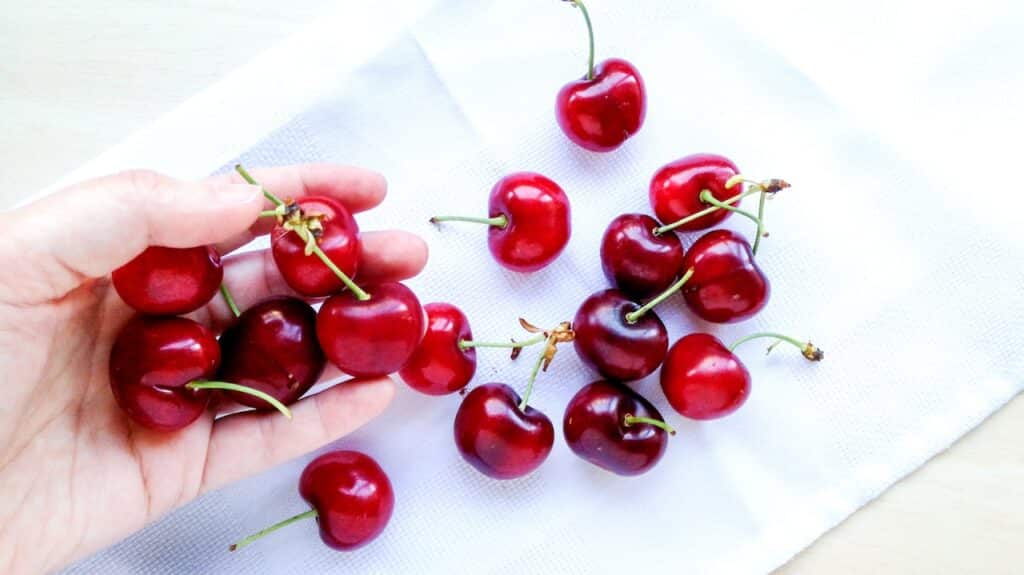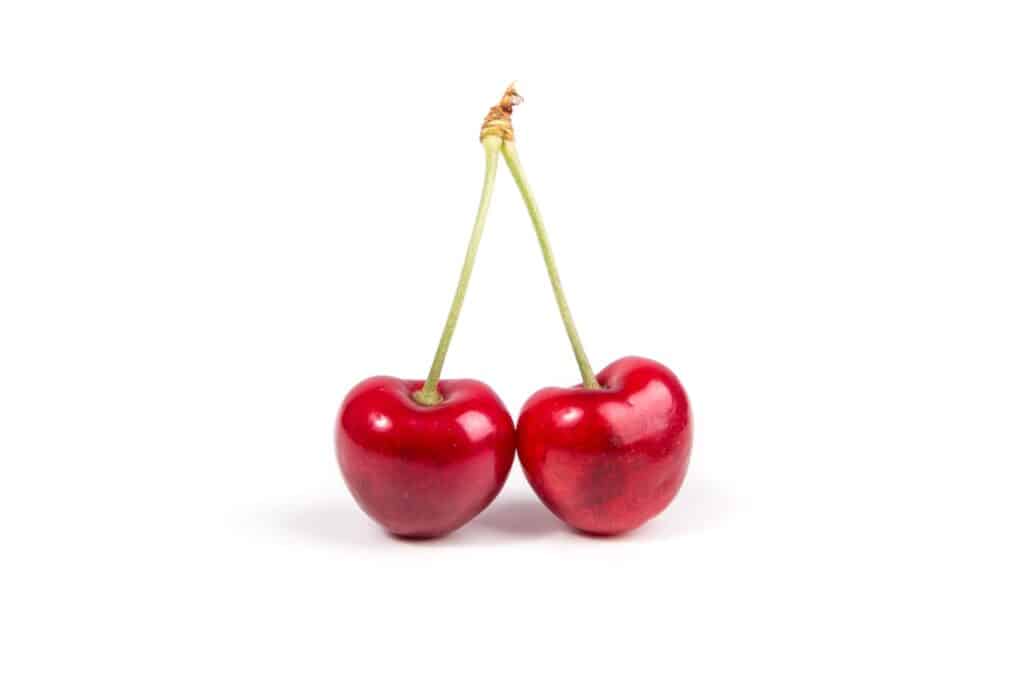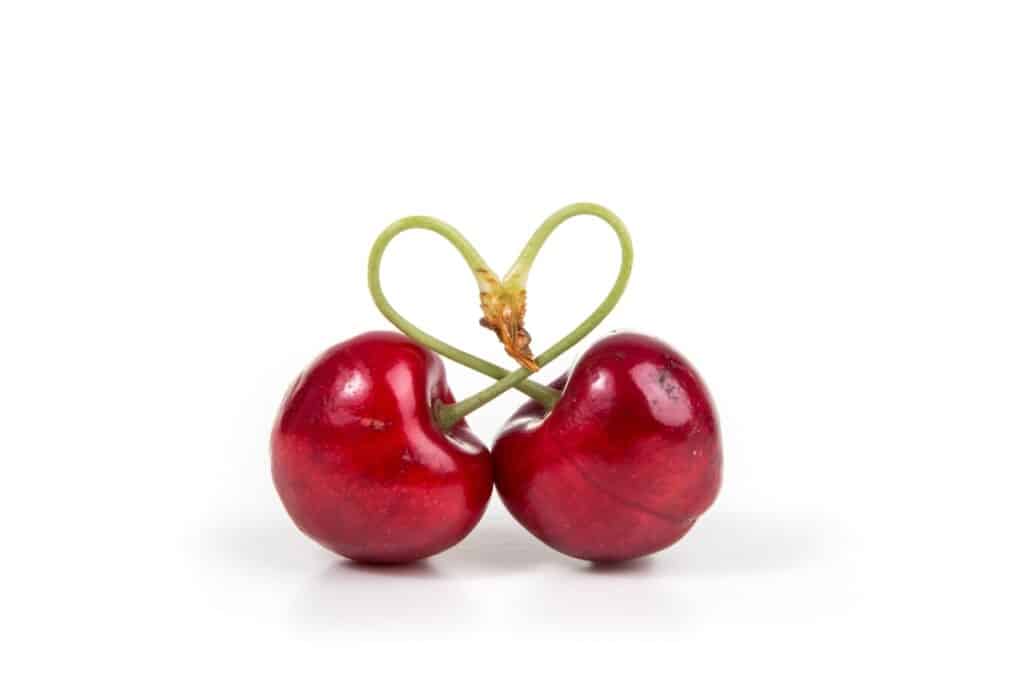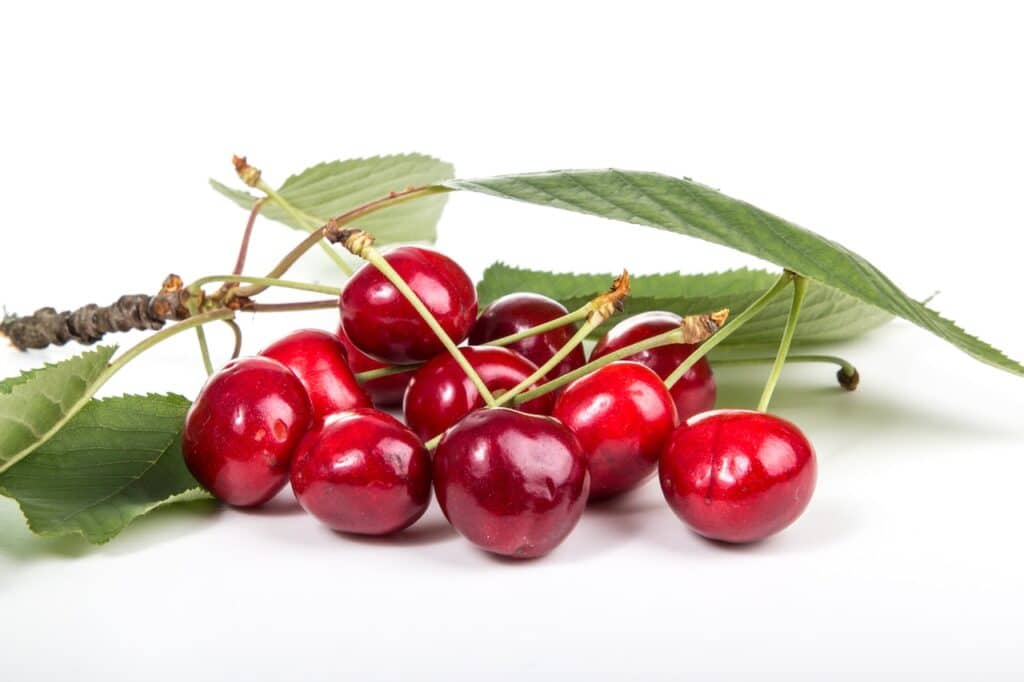Cherries are super tasty in pies and ice cream, and they’re also delicious when you eat them fresh. In spring, cherries are a favorite fruit because they’re sweet, juicy, and good for you. People often wonder if can dogs eat cherries because they’re curious if it’s safe for their furry friends to enjoy this yummy fruit.
Table of Contents
Read also: Can dogs have tuna?

Can dogs eat cherries?
Cherries aren’t safe for our furry friends to eat. Even though these sweet fruits have some good vitamins and minerals, they can be harmful to dogs. In this article, we’ll talk about why it’s not a good idea to give cherries to your dog and the risks it can pose.
Benefits of cherries for dogs
Cherries can be good for dogs and offer health benefits, such as:
- Moderate Calories: They have a fair amount of calories, making them a suitable treat without adding too much energy to your dog’s diet.
- Fiber Boost: Cherries provide fiber, which may not be digested by dogs, but it helps with a feeling of fullness, supports gut health, and regulates bowel movements.
- Rich in Vitamins: Cherries contain vitamins like C, thiamine, folates, and provitamin A, along with essential minerals like potassium, magnesium, iron, phosphorus, and calcium.
- Antioxidant Power: Anthocyanins in cherries have antioxidant, anti-inflammatory, and anti-cancer properties.
- Antitumor Activity: Cherries contain peryl alcohol, a type of monoterpene that acts against tumors and protects the body from cellular aging caused by free radicals.
- Even though cherries can be beneficial, it’s crucial to feed them to your dog in moderation and ensure they are prepared . Always consult with your vet before introducing new foods into your dog’s diet.
How to give cherries to my dog?
While cherries can be good for dogs, it’s crucial to consider the following points to ensure their consumption doesn’t cause any health issues:
- Cyanide Concern: The pulp of cherries is beneficial, but their seeds, leaves, and stems contain cyanide, which is toxic to dogs and can lead to poisoning. It’s important never to feed dogs cherries with seeds or stems.
- Safe Preparation Steps:
- Wash cherries to remove pesticides or contaminants.
- Remove the stem and seeds before offering them to your dog.
- Cut cherries into small pieces to prevent choking.
- Fresh is Best: Only offer cherries to dogs in their natural, fresh state. Avoid giving them cherry products like jam or syrup, as these can have high sugar content and may not be suitable for dogs.
Following these precautions ensures that cherries can be a safe and enjoyable treat for your furry friend. Always consult with your vet if you have any concerns about adding new foods to your dog’s diet.

Dose of cherries for dogs
While many dogs love the taste of fruit, it’s essential to avoid daily consumption due to its high sugar content. The healthiest approach is to include cherries and other fruits, as a special treat.
For cherries, as a general guideline, you can offer 2 to 4 units (adjusting based on your dog’s size) once a week. This ensures a balanced and enjoyable addition to your dog’s diet without excess sugar intake. Always be mindful of your dog’s individual needs and consult with your vet to determine the best treatment routine for your furry friend.
Side effects of cherries for dogs
The red, juicy flesh of cherries is full of antioxidants, but it comes with risks for our furry friends.
- Intestinal Obstruction:
- Eating cherry stones or stems can lead to a blockage in the stomach or intestines, requiring surgery. This can cause symptoms like abdominal pain, diarrhea, vomiting, and loss of appetite. Dogs of all sizes, including large breeds, are at risk.
- Cyanide Poisoning:
- Cherry stones, stems, and leaves contain amygdalin, which turns into cyanide when swallowed. Dogs are susceptible, and cyanide can damage vital organs, leading to death. Even one or two cherry stones pose a risk.
- Broken Tooth:
- Cherry stones are hard and can break a dog’s tooth if eaten whole. Fractured teeth may need extraction to prevent infection and jaw disease, especially in puppies and small breeds.
- Gastrointestinal Upset:
- Moldy pits in cherries can cause upset stomachs in dogs. Sensitive stomachs may react to new additions to their diet.
- Poisoning from Rotten Fruits:
- Overripe cherries in orchards can ferment, turning fructose into alcohol. If dogs consume these, they can get drunk, leading to poisoning.
To keep your dog safe, avoid giving cherries with pits, stems, or leaves, and monitor for any signs of discomfort or illness. If in doubt, consult your vet.
What if my dog ate a cherry?
Veterinary toxicologists, and experts in toxins and poisons, explain that the risk of cyanide toxicity from cherries depends on your dog’s size and whether they chew the stones. Large dogs might not face immediate danger with a cherry or two, but it’s better to be cautious.
For puppies and small breeds like Pomeranians and Chihuahuas, the risk is higher due to their smaller digestive tracts. Keep an eye out for these signs if you suspect your dog ate too many cherries:
- Rapid or difficult breathing
- Bright red gums
- Dilated pupils
- Increased salivation
- Seizure
- Paralysis
- If you notice any of these symptoms, contact your vet or the ASPCA Animal Poison Control Center. It’s always better to seek professional advice, especially when it comes to your pet’s health.
Can dogs eat pitted cherries?
Choosing cherries with the stems and pits removed can be a safer option for your dog. These bite-sized red fruits offer nutritional benefits such as fiber for digestion, vitamin C for immunity, and vitamin A for eye health.
However, if you’re looking for convenient alternatives without the potential health risks of cherries or the need to remove stems and pits, consider options like apple slices and blueberries. These fruits are also tasty and provide various health benefits for your furry friend.

Are cherries bad for dogs?
The world has over 1,000 cherry varieties, each with its unique look and taste, like Bing, Rainier, and Maraschino cherries. While Maraschino cherries, famous in cocktails, don’t have a hard pit, it’s wise to steer clear of them for dogs. Despite lacking pits, Maraschino cherries are high in sugar, which can lead to short-term gastrointestinal issues and long-term problems like obesity and diabetes in dogs.
Conclusion: Can dogs eat cherries?
Yes, dogs can eat the red part of cherries, but the pits and stems are not safe. They contain something called cyanide, which is harmful to dogs, especially if they eat a lot. Puppies and small dogs are at more risk because their stomachs are smaller.
It’s a lot of work to take out the pits and stems, and some vets suggest not giving cherries to dogs at all. So, it’s better to keep cherries away from your dog to avoid any problems. If you’re near a place with a lot of cherries, it’s a good idea to keep your dog on a leash to prevent them from getting into trouble.
